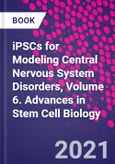The series Advances in Stem Cell Biology is a timely and expansive collection of comprehensive information and new discoveries in the field of stem cell biology.
iPSCs for Modeling Central Nervous System Disorders, Volume 6 addresses how induced pluripotent stem cells can be used to model various CNS disorders.
Somatic cells can be reprogrammed into?Induced pluripotent stem cells?by the expression of specific transcription factors. These cells?are transforming biomedical research in the last 15 years. The volume teaches readers about current advances in the field. This book describes the use of induced pluripotent stem cells to model several CNS diseases in vitro, enabling us to study the cellular and molecular mechanisms involved in different CNS pathologies. Further insights into these mechanisms will have important implications for our understanding of CNS disease appearance, development, and progression. In recent years, remarkable progress has been made in the obtention of induced pluripotent stem cells and their differentiation into several cell types, tissues and organs using state-of-art techniques. These advantages facilitated identification of key targets and definition of the molecular basis of several CNS disorders. This volume will cover what we know so far about the use of iPSCs to model different CNS disorders, such as: Alzheimer's disease, Autism, Amyotrophic Lateral Sclerosis, Schizophrenia, Fragile X Syndrome, Spinal Muscular Atrophy, Rett Syndrome, Angelman syndrome, Parkinson`s Disease, Leber Hereditary Optic Neuropathy, Anorexia Nervosa, and more.
The volume is written for researchers and scientists interested in stem cell therapy, cell biology, regenerative medicine, and neuroscience; and is contributed by world-renowned authors in the field.
Please Note: This is an On Demand product, delivery may take up to 11 working days after payment has been received.
Table of Contents
1. In Vitro Human Stem Cell Mediated CNS Platforms: Progress and Challenges2. Human iPSCs-Based Modeling of Alzheimer's Disease, A Glial Perspective
3. Human iPSCs-Based Studies; A New Route Toward Modelling Autism Spectrum Disorders
4. Induced Pluripotent Stem Cells (iPSCs) as Models for Amyotrophic Lateral Sclerosis (ALS)
5. iPSCs for Modeling Schizophrenia Pathogenesis
6. Human Pluripotent Stem Cells in The Research of Fragile X Syndrome
7. Induced Pluripotent Stem Cells for Modeling of Spinal Muscular Atrophy
8. Induced Pluripotent Stem Cells for Disease Modelling of Rett Syndrome
9. iPSCs for Modeling Angelman Syndrome
10. iPSCs for Modeling of?X-Linked Dystonia-Parkinsonism
11. Studying Non-Cell-Autonomous Neurodegeneration in Parkinson's Disease with Induced Pluripotent Stem Cells
12. Induced Pluripotent Stem Cell-Based Leber Hereditary Optic Neuropathy Model
13. Investigating the Pathophysiology of Anorexia Nervosa Using Induced Pluripotent Stem Cells: Background, Current Trends, and Perspectives
Authors
Alexander Birbrair Department of Pathology, Federal University of Minas Gerais, Belo Horizonte, Minas Gerais, BrazilDepartment of Radiology, Columbia University Medical Center, Medical Center, USA. Dr. Alexander Birbrair received his bachelor's biomedical degree from Santa Cruz State University in Brazil. He completed his PhD in Neuroscience, in the field of stem cell biology, at the Wake Forest School of Medicine under the mentorship of Osvaldo Delbono. Then, he joined as a postdoc in stem cell biology at Paul Frenette's laboratory at Albert Einstein School of Medicine in New York. In 2016, he was appointed faculty at Federal University of Minas Gerais in Brazil, where he started his own lab. His laboratory is interested in understanding how the cellular components of different tissues function and control disease progression. His group explores the roles of specific cell populations in the tissue microenvironment by using state-of-the-art techniques. His research is funded by the Serrapilheira Institute, CNPq, CAPES, and FAPEMIG. In 2018, Alexander was elected affiliate member of the Brazilian Academy of Sciences (ABC), and, in 2019, he was elected member of the Global Young Academy (GYA), and in 2021, he was elected affiliate member of The World Academy of Sciences (TWAS). He is the Founding Editor and Editor-in-Chief of Current Tissue Microenvironment Reports, and Associate Editor of Molecular Biotechnology. Alexander also serves in the editorial board of several other international journals: Stem Cell Reviews and Reports, Stem Cell Research, Stem Cells and Development, and Histology and Histopathology.








